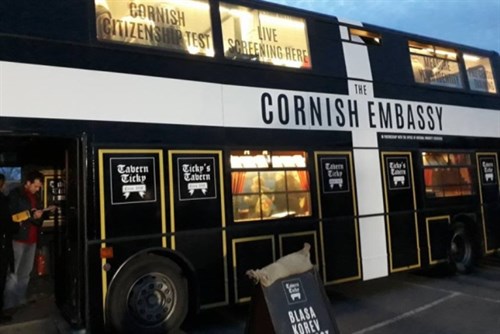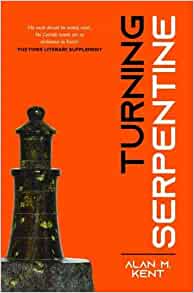News from KMTU - Cornwall Council issues cross party call to Westminster Government on 6th anniversary of FCPNM status - 'Turning Serprentine' by Dr Alan M Kent
Cornwall Council calls on government to give Cornwall the recognition it deserves on sixth anniversary of Cornish minority status
Friday 24th April, 2020 marks the sixth anniversary of the Cornish being recognised as a national minority – and while Cornwall Council’s immediate focus is on responding to the coronavirus crisis, the council and partners have expressed concern that the Census Order (England and Wales) laid before Parliament on March 2, 2020, ignores the wishes of many people in Cornwall by not including a Cornish tick box in the 2021 Census.
National minority status means that the proud history, unique culture, and distinctive language of Cornwall are fully recognised, and it affords the Cornish the same status under the Framework Convention for the Protection of National Minorities as the UK’s other Celtic people: the Scots, the Welsh and the Irish. All three are represented by an identity tick-box on the Census.
The Census Order is due to be debated in Parliament in the next few weeks when it is hoped MPs across the political spectrum and from all parts of the country will support the inclusion of a Cornish identity tick-box.
As a show of unity across the council, the Leader of Cornwall Council, Julian German, and the authority’s group leaders - Linda Taylor (Conservative), Malcolm Brown (Liberal Democrat), Carolyn Rule (Independent), Stephen Barnes (Labour) and Dick Cole (Mebyon Kernow) – have collectively sent a letter to the Minister for State for the Cabinet Office, Chloe Smith MP, and other prominent figures at Westminster requesting the Government to include a Cornish tick-box.
Cornwall Council leader Julian German said: “Today marks the sixth anniversary of the recognition of the Cornish as a national minority through the Framework Convention for the Protection of National Minorities, when the UK Government pledged that the Cornish would be afforded ‘the same status… as the UK’s other Celtic people - the Scots, the Welsh and the Irish.’
“We are working closely with Cornwall’s MPs on this matter and we have appealed to the UK Government to add a Cornish tick-box to the next census.
“This would help central government to meet its obligations through the Framework Convention and show that it is treating the Cornish in the same manner as the Scots, the Welsh and the Irish. It would also demonstrate a positive commitment to Cornwall’s national identity and culture.”
Since 2014, much has been achieved in Cornwall.
The council has worked with partners on initiatives like the Cornish Embassy ‘tick box’ bus (photograph below), and to increase access to learning Cornish face-to-face through technology and in schools.
Last July, the Cornish Minority Working Group hosted the first UK National Minority Summit. The event brought together representatives from the UK’s national minorities, aiming to strengthen the links between UK minority nations.
September 2019 saw the opening of Cornwall’s state-of-the art archive centre, Kresen Kernow, which houses the world’s largest collection of historic records, books, maps and photographs relating to Cornwall.
Proposals recommending a single parliamentary seat stretching across Devon and Cornwall – dubbed ‘Devonwall’ – were also abandoned following an outcry from people from on both sides of the Tamar. The review was carried out after Parliament suggested that the number of MPs should be reduced from 650 to 600.
Despite these successes, there is no stable central government funding for Cornish culture and language.
Cornwall Council has had to find new and innovative ways of promoting the language, such as developing new Cornish language learning apps like Magi Ann Kernewek, supporting schools that want to teach Cornish, and working with partners, such as theatres and museums, to use more Cornish in events.
The council remains committed to ensuring the Cornish can access the linguistic and cultural rights accorded by the Framework Convention.
This includes pressing the government for Cornish people to be given the right to identify themselves as Cornish in the national Census.
An excellent read - 'Turning Serpentine' a novel by Alan M Kent
Set on The Lizard (An Lysardh in the Cornish language), the remote southernmost peninsula of the island of Britain – bound in Celtic myth and legend, and entwined with sacred geometry – Alan M. Kent’s provocative new novel examines the ancient profession of craftsmen who work and turn the unique, patterned stone found there, known as serpentine.
It begins with the war-time discovery of newly-born twins, who are found abandoned and afloat upon the ocean, and culminates in a beautiful but haunting love story of people placed on the very edge of life.
Kent combines this narrative with a set of compellingly original characters, all the time reminding us that communication can transport us to new worlds and relationships, yet the lack of it (ironically on a Cape famed for Marconi and its telecommunications history) can also maim and destroy.
In this novel, Cornish people, their challenges, heritage and landscape are conjured up with uncanny poetry and perceptiveness. On this far tip of the known world, the Christian and Pagan fuse; the sea and land merge as one.
The story offered is both tender and cruel, and Kent – Winner of the 2018 Holyer an Gof Prize for Fiction – writes with a passionate sincerity about his people. Seizing on folktale, fairy story and sometimes narrative that is magical and outlandish, he creates a new fable for Cornwall.
Link to publishers website: http://www.halsgrove.com/proddetail.php?prod=9781906551452 and available elsewhere too!
Alan M. Kent was born in the china clay mining region of Cornwall and graduated from the universities of Cardiff and Exeter, specialising in Celtic and Anglo-Celtic literatures. For several years he worked as a teacher, and is now a Senior Lecturer in Literature for the Open University in South-West Britain and a Visiting Fellow in Celtic Studies at the University of La Coruña, Galicia. His novel Dan Daddow’s Cornish Comicalities won the Holyer an Gof Prize for Fiction in 2018. In addition to writing novels, he has published a number of prize-winning plays and acclaimed volumes of poetry. His adaptation of The Mousehole Cat toured internationally in 2019. As well as his non-fiction writing, he has also edited several collections of Cornish and Anglo-Cornish Literature. He is the series editor of Lesser Used Languages of Europe, and joint series editor of Cornish and Celtic Alternatives.
Imprint: Ryelands. ISBN 978 1 906551 45 2, softback, 197x130mm, 400 pages. Published September 2019.
Kernow bys vyken!
Matt, Tony, John, Teresa, Alex, Clive, Craig, Maria, Ronan, Mark, Rob & MikeSteering Group Members - KMTU







